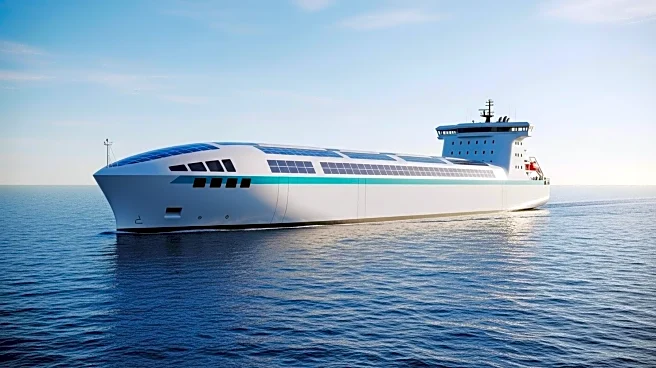What's Happening?
DNV has released its ninth Maritime Forecast to 2050, highlighting the shipping industry's transition from ambition to action in decarbonization efforts. The report, presented during the London International Shipping Week, notes an increase in orders for dual-fuel vessels and new technologies, despite challenges in supply and infrastructure. DNV emphasizes the need for diverse solutions, including LNG and carbon capture, to meet decarbonization goals. The anticipated adoption of the IMO's Net-Zero Framework is expected to shape the industry's future, with DNV estimating the framework will double costs but remain manageable through strategic approaches.
Why It's Important?
The shipping industry's move towards decarbonization is crucial for reducing global greenhouse gas emissions, given its significant contribution to climate change. The adoption of the IMO's Net-Zero Framework could drive substantial investments in clean technologies and infrastructure, potentially transforming the industry. However, the increased costs associated with the framework may pose challenges for smaller operators, necessitating innovative solutions to balance economic viability with environmental responsibility. The industry's progress could also influence regulatory developments and encourage other sectors to enhance their sustainability efforts.
What's Next?
The upcoming adoption of the IMO's Net-Zero Framework is expected to provide greater certainty for the shipping industry, potentially spurring investments in infrastructure and technology. DNV's proposal for 'Carbon Capture Corridors' and the development of offloading/storage capabilities in key ports could play a significant role in reducing emissions. As the industry adapts to new standards, operators may prioritize larger vessels for compliance, while shipbuilders face capacity challenges in meeting demand for new, sustainable tonnage.
Beyond the Headlines
The report highlights the geopolitical and technological factors shaping the shipping industry's decarbonization journey. The focus on diverse fuel solutions and carbon capture reflects a broader trend towards integrated approaches to sustainability. The industry's efforts may also have implications for global trade patterns and supply chain resilience, as companies navigate the complexities of transitioning to low-carbon operations.










